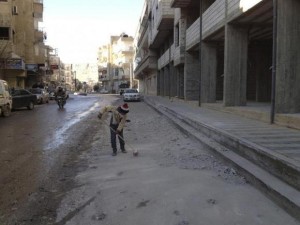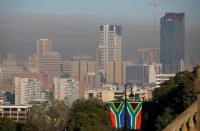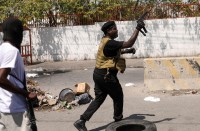By Stephanie Nebehay

A boy cleans debris near buildings damaged by what activists said were shelling by forces loyal to President Bashar al-Assad, at Yabroud, near Damascus January 3, 2013.
Credit: Reuters/Shaam News Network/Handout
GENEVA Fri Feb 14, 2014 11:52am EST
(Reuters) – Thousands of people have fled a rebel-held town in Syria after it was bombed and shelled in an operation that has prompted fears of a major assault by ground troops, the United Nations said on Friday.
The fighting came as peace talks in Geneva neared the end of a second round with the government and opposition sides as far from agreement as ever, both sticking to their known positions.
Military action in the town of Yabroud, in western Syria near the border with Lebanon, would fit with the government’s aim of securing a corridor linking Damascus with President Bashar al-Assad’s heartland on the Mediterranean coast.
“We have received reports from within Syria that there have been numerous aerial attacks and shelling along with a military build-up around the town, suggesting a major assault by land may be imminent,” U.N. human rights spokesman Rupert Colville said.
“We understand that there remains a large number of civilians in Yabroud, with some estimates suggesting as many as 40,000 to 50,000 people, with thousands of others fleeing over the last few days,” he said
Electricity was cut off on Wednesday and field hospitals are short of medical supplies as scores of people require urgent treatment, Colville told a news briefing in Geneva.
Failure to allow civilians to leave would amount to “grave violations” of international humanitarian law by Damascus.
About 500 or 600 fleeing families have already arrived in Arsal, Lebanon, and the U.N. refugee agency expects a big influx across the border, UNHCR spokeswoman Melissa Fleming said.
Al-Manar television, run by Assad’s allies in the Lebanese Shi’ite group Hezbollah, said the Syrian army had advanced in the Yabroud area, seizing control of the town’s main road and a nearby border crossing it said was used for smuggling.
In Geneva, international mediator Lakhdar Brahimi told delegates that he plans to take the talks into a third round but has not set a date for their resumption, opposition negotiator Ahmad Jakal said.
Brahimi said there would be a further session of talks on Saturday and he would fly to New York shortly to meet U.N. Secretary General Ban Ki-moon, Jakal told Reuters.
PEACE TALKS
A senior Russian diplomat said Damascus was committed to peace talks but would not discuss the creation of a transitional governing body until its opponents pledge a joint fight against “terrorism”, the term Syria uses for the revolt.
The opposition meanwhile has insisted that talk of ending the war, which has killed more than 130,000 people, is futile without agreeing on the transitional government that would oversee any peace deal.
“I would not say the negotiations are at a dead-end – they haven’t even started,” Russian Deputy Foreign Minister Gennady Gatilov said in Geneva, according to the Itar-Tass news agency. “Unfortunately, the sides have not yet agreed an agenda.”
Russia has been Assad’s most powerful international supporter during the conflict, using its veto in the U.N. Security Council to block Western and Arab efforts to pressure his government with condemnation and the threat of sanctions.
A senior U.S. official said Syria’s government delegation had been “stonewalling every step of the way” in the Geneva talks and Washington expected Russia to pressure them to engage seriously in the peace process.
The only tangible achievement of the negotiations so far has been a temporary ceasefire in Homs to allow in humanitarian aid and to let people leave the city.
One man waiting among a group of evacuees from Homs for questioning by Syrian security forces, Hodwan al-Masri, said he knew he could not hide his identity.
“I am a known brigade commander, with my face all over social media,” he said.
Masri left the city in the hope of persuading the authorities to let him go into exile. “All I need is 48 hours and I’ll be out of the country. I hope they let me go.”
Males between 15 and 55 years old – of military age according to the Syrian authorities – have been held in a school for screening, raising fears they may be imprisoned, tortured or killed.
Elsewhere, a car bomb killed at least 32 people the town of al-Yadouda near the border with Jordan on Friday, including 10 rebel fighters and at least one child, the Syrian Observatory for Human Rights reported.
Near Aleppo, an al Qaeda splinter group executed at least 21 people, including relatives of fighters from rival rebel groups, the Observatory added, an incident that could worsen infighting among enemies of Assad. It threw 17 bodies into a well.
(Reporting by Stephanie Nebehay in Geneva and Tom Perry in Beirut; writing by Giles Elgood; editing by Philippa Fletcher)








